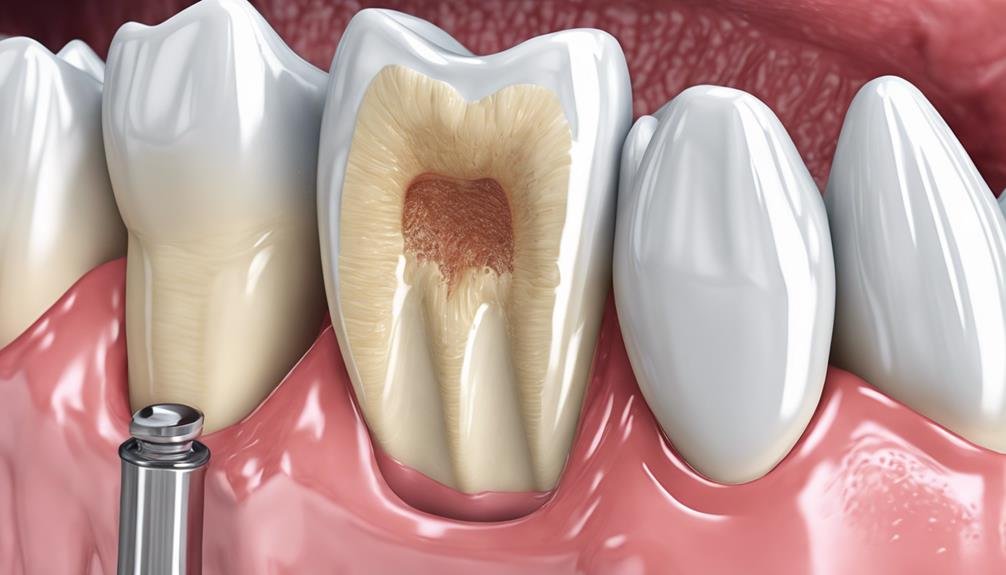When it comes to permanent teeth whitening procedures, the risks can be as intricate as untangling a knotted chain. From potential tooth sensitivity to gum irritation and even enamel damage, the journey to a brighter smile isn't without its hazards.
But what specific dangers lurk beneath the surface, waiting to be uncovered? Let's navigate the landscape of risks involved in permanent teeth whitening procedures to shed light on what individuals should be cautious of before taking the plunge.
Key Takeaways
- Tooth sensitivity risks are common during and after whitening procedures.
- Gum irritation can occur if trays are not properly fitted.
- Enamel damage is possible with strong bleaching agents.
- Over-whitening can harm enamel, cause discoloration, and increase sensitivity.
Tooth Sensitivity Risks

When considering the risks associated with permanent teeth whitening, tooth sensitivity emerges as a common concern affecting a significant percentage of individuals undergoing whitening procedures. Up to 75% of people who opt for whitening treatments may experience sensitivity either during the procedure or for a few days post-treatment. This sensitivity can manifest as discomfort when consuming hot, cold, or sweet foods and beverages. The bleaching agents utilized in whitening procedures have the potential to penetrate the enamel, irritating the nerve endings in the teeth and leading to temporary sensitivity issues.
Individuals with pre-existing tooth sensitivity or those with thin enamel are at a higher risk of heightened sensitivity due to permanent teeth whitening procedures. To address this concern, dentists often recommend desensitizing agents or specialized toothpaste to alleviate sensitivity symptoms and enhance the overall comfort of patients undergoing whitening treatments. Proper guidance and care before, during, and after the whitening procedure can help manage tooth sensitivity effectively.
Gum Irritation Concerns
Gum irritation is a prevalent concern associated with permanent teeth whitening procedures due to the potential contact of whitening agents with the soft tissues of the gums. This issue can lead to discomfort and complications if not managed properly.
Here are some key points to consider:
- Symptoms: Keep an eye out for signs of gum irritation such as redness, swelling, tenderness, or even mild bleeding. These indicate that the soft tissues of your gums may be reacting to the whitening agents used in the procedure.
- Prevention: Using properly fitted trays and undergoing whitening treatments under professional supervision can help minimize the risk of gum irritation. The trays help in ensuring that the whitening agent stays on your teeth and away from your gums, reducing the likelihood of irritation.
- Communication: It's essential to communicate any discomfort or issues with your gums to your dentist promptly. Timely communication can help address any concerns and ensure a safe and effective teeth whitening experience.
Enamel Damage Potential

Considering the risks associated with permanent teeth whitening, it's crucial to be aware of the potential for enamel damage stemming from the use of strong bleaching agents. When high concentrations of bleaching agents, such as peroxide, are applied to the teeth, the enamel can weaken, making it more prone to erosion. Continuous or frequent whitening treatments with strong chemicals can compromise the enamel's integrity, leading to long-term issues.
Enamel damage resulting from permanent teeth whitening may present as increased tooth sensitivity, roughening of the tooth surface, or alterations in tooth structure. To mitigate the risk of enamel damage, it's essential to adhere to professional guidelines and recommendations. By following these guidelines, you can help safeguard your enamel from potential harm and maintain the health of your teeth while pursuing a brighter smile.
Over-Whitening Dangers
Excessive whitening of your teeth poses risks that can lead to enamel damage and various dental complications if not approached with caution and moderation.
Dangers of Over-Whitening:
- Enamel Damage: Over-whitening can weaken the enamel, making teeth more prone to sensitivity and decay.
- Tooth Discoloration: Excessive bleaching may result in tooth discoloration, giving them a chalky appearance.
- Gum Irritation: Overuse of whitening products can irritate the gums, causing inflammation and discomfort.
When over-whitening occurs, it can lead to translucent teeth, where the edges appear almost see-through, further weakening the tooth structure and increasing the risk of fractures and other dental issues.
To prevent these risks, it's crucial to follow recommended guidelines and consult with a dental professional before undergoing any teeth whitening procedure. Remember, moderation is key to achieving a brighter smile without compromising your dental health.
Allergic Reactions Warning

To ensure a safe teeth whitening experience, it's crucial to be aware of the potential risks associated with allergic reactions to whitening products. Allergic reactions to teeth whitening products can vary from mild skin irritation to severe swelling and breathing difficulties.
Ingredients like hydrogen peroxide and carbamide peroxide, common in whitening products, can act as allergens triggering sensitivities in some individuals. Symptoms of an allergic reaction may manifest as itching, redness, hives, or in rare cases, anaphylaxis.
Prior to a full whitening treatment, patch testing is recommended to identify any potential allergies and prevent adverse reactions during the procedure. If you have a history of allergies or sensitivities, it's essential to consult with a dentist or allergist before undergoing permanent teeth whitening to minimize the risks involved.
Being proactive and informed about possible allergic reactions to teeth whitening products can help you ensure a safer and more comfortable whitening process.
Frequently Asked Questions
Is Permanent Teeth Whitening Safe?
Permanent teeth whitening procedures can pose risks, including potential harm to enamel and gums. Long term effects may include sensitivity and structural changes. To ensure safety, have a dental professional supervise and follow post-treatment guidelines.
Are There Any Risks to Teeth Whitening?
When it comes to teeth whitening, being aware of the risks is crucial. Long term effects like tooth sensitivity, enamel damage, gum irritation, and discoloration risks are possible. Over whitening, DIY attempts, and allergic reactions highlight the importance of professional supervision and consultation.
Why Is Teeth Whitening Not Recommended?
Teeth whitening is not recommended for various reasons including sensitivity issues, enamel damage, and unsatisfactory results. It can be a costly treatment with long-term effects, requiring maintenance. Risks include tooth decay, allergic reactions, and cosmetic risks.
Are There Any Side Effects of Teeth Whitening Procedure?
When you undergo a teeth whitening procedure, you may experience sensitivity, gum irritation, and potential enamel damage. Be aware of long-term effects like discoloration risks and staining potential. Seek professional guidance for post-treatment care to avoid health implications and allergic reactions.
Conclusion
Congratulations on your decision to undergo permanent teeth whitening procedures!
Just remember, the risks involved in this process are as bright as your new smile. From tooth sensitivity to enamel damage, it's important to be aware of the potential pitfalls.
So, go ahead and bleach away, but tread carefully to avoid a whitening disaster.
Your smile will thank you!
